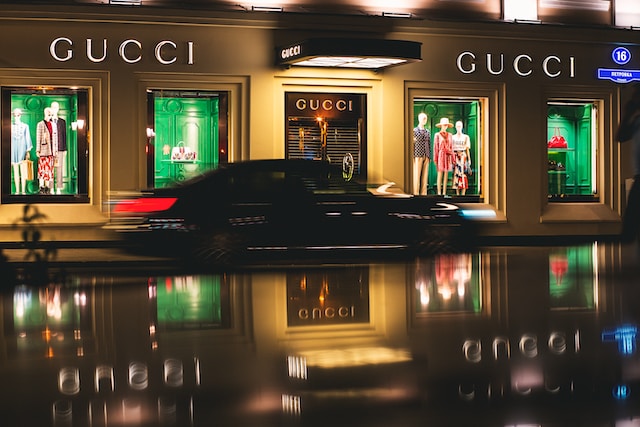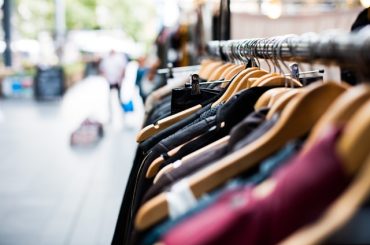Before we dive deep into the PESTEL analysis, let’s get the business overview of Gucci. Gucci is a world-renowned luxury fashion brand founded by Guccio Gucci in Florence, Italy, in 1921. It is part of the global luxury group Kering, which manages a diverse portfolio of leading luxury and sports brands.
Gucci’s product lines include ready-to-wear clothing, leather goods, footwear, accessories, watches, jewelry, eyewear, fragrances, and cosmetics. The brand is known for its rich heritage, iconic designs, and commitment to quality and craftsmanship.
Over the years, Gucci has expanded its global presence, operating through a network of directly used stores, e-commerce platforms, and wholesale partners. The brand also strongly advocates sustainability and has made significant strides in incorporating eco-friendly materials and practices into its operations.
In recent years, Gucci has experienced a resurgence in popularity under the creative direction of Alessandro Michele, who has revitalized the brand with a modern, eclectic, and innovative aesthetic. This has resulted in strong financial performance, with growing revenues and market share within the luxury fashion industry.
Additionally, Gucci has embraced digitalization and e-commerce, adapting to the changing retail landscape and leveraging social media platforms to engage with a younger, global audience. The brand also collaborates with various artists, designers, and celebrities, which has helped to maintain its status as a leading luxury fashion house.
Financial Performance 2023: Gucci’s 2023 revenue was €9.9 billion, down 6% as reported and down 2% on a comparable basis. Sales from the directly operated retail network, which accounts for 91% of revenue, dropped 2% on a comparable basis. Wholesale revenue was down 5% on a comparable basis.
Gucci Marketing Strategy: Lessons From Instagram’s Favorite Luxury Brand
Here is the PESTEL analysis of Gucci
A PESTEL analysis is a strategic management framework used to examine the external macro-environmental factors that can impact an organization or industry. The acronym PESTEL stands for:
- Political factors: Relate to government policies, regulations, political stability, and other political forces that may impact the business environment.
- Economic factors: Deal with economic conditions and trends affecting an organization’s operations, profitability, and growth.
- Sociocultural factors: Relate to social and cultural aspects that may influence consumer preferences, lifestyles, demographics, and market trends.
- Technological factors: Deal with developing and applying new technologies, innovations, and trends that can impact an industry or organization.
- Environmental factors: Relate to ecological and environmental concerns that may affect an organization’s operations and decision-making.
- Legal factors: Refer to the laws and regulations that govern businesses and industries.
In this article, we will do a PESTEL Analysis of Gucci.
PESTEL Analysis Framework: Explained with Examples
Political
- Trade Regulations: Political decisions like import/export tariffs and quotas can affect trade regulations. These trade policies would significantly impact Gucci, which has its products manufactured in Italy and sells them worldwide.
- Stability of Political Environment: Countries with a stable political environment are attractive to luxury brands like Gucci. Political instability can be risky for both retail operations and potential sales, as consumers might curb their spending during uncertain times.
- Intellectual Property Laws: Counterfeit products are a challenge for luxury brands. Effective intellectual property (IP) laws in various countries can help protect brands like Gucci from fake reproductions.
- Taxation Policies: Corporate tax policies in countries where Gucci operates can influence its profitability. For instance, some countries might offer tax incentives for businesses to establish manufacturing or retail operations there.
- Foreign Direct Investment (FDI) Policies: Restrictions or support on FDI can influence Gucci’s decision to invest in retail spaces, manufacturing units, or other facilities in a given country.
- Governmental Attitude toward the Industry: If a government supports the fashion and luxury industry, perhaps by promoting fashion events or providing subsidies for research and development, it can positively affect Gucci.
- Labor Laws: Labor laws dictate the relationship between employers like Gucci and their employees, affecting areas like wages, working hours, and working conditions. Gucci, which is known for its craftsmanship, would need to ensure that its artisans are working under fair and legal conditions.
- Trade Alliances: Membership in trade alliances or groups can impact how Gucci does business. For example, if Italy (where Gucci is based) is part of a trade alliance, it may benefit from reduced tariffs or other trade benefits with other member countries.
- Ethical Considerations & Corporate Social Responsibility: In today’s world, it’s about complying with laws and adhering to ethical practices. Being a luxury brand, Gucci is expected to source materials ethically, ensure the fair treatment of employees, and take on corporate social responsibility initiatives.
- Government’s Economic Policies: Policies related to inflation, economic growth, and other economic indicators can indirectly impact the purchasing power of consumers and thus influence sales of luxury items like those of Gucci.
Economic
- Global Economic Climate: The global economy’s health can significantly impact luxury sales. During economic downturns or recessions, consumers may reduce spending on luxury items. Conversely, during periods of economic growth, luxury purchases might increase.
- Exchange Rates: Gucci operates in various countries, so fluctuating exchange rates can affect the profitability of international products. For instance, if the Euro becomes stronger compared to other currencies, Gucci products might become more expensive for international customers.
- Inflation Rates: Inflation can affect both the cost of producing goods and consumer purchasing power. Higher inflation might mean increased production costs for Gucci, and if wages don’t keep up with inflation, it could reduce consumers’ ability to buy luxury goods.
- Interest Rates: Interest rates influence borrowing costs. High-interest rates could increase costs if Gucci needs to finance expansions or other initiatives. Additionally, interest rates can influence consumers’ spending habits; high rates might discourage spending on credit.
- Employment Levels/Unemployment Rates: High employment levels generally lead to higher disposable incomes, benefiting luxury brands like Gucci. High unemployment rates, on the other hand, could suppress luxury spending.
- Income Distribution: The distribution of wealth within societies affects luxury brands. A more significant wealthy segment in the population can lead to increased sales for brands like Gucci. However, if income inequality becomes a significant social issue, it might lead to a backlash against visible signs of wealth, affecting luxury brands.
- Economic Growth in Key Markets: Gucci will pay close attention to emerging markets or markets showing strong economic growth, as these areas might represent significant expansion and sales growth opportunities.
- Taxation Policies: As mentioned in the political section, taxation affects profitability. However, from an economic perspective, taxation can also influence consumer purchasing power. For example, high sales taxes might reduce the attractiveness of luxury purchases.
Sociocultural
- Fashion Trends and Preferences: Societies have different fashion trends and tastes that can evolve. What’s trendy in one region or culture might not be in another. Gucci must continuously adapt and design products that resonate with varying global tastes.
- Cultural Attitudes Toward Luxury: Different cultures view luxury differently. In some societies, luxury items like those from Gucci are seen as symbols of success and status, while others might view them as excessive or ostentatious.
- Social Movements: Movements such as sustainability, ethical sourcing, and anti-fast fashion have grown. Consumers are increasingly concerned about where and how their products are made. Gucci must be aware of these movements and adapt its business strategies accordingly.
- Demographics: Changes in population age, gender dynamics, or other demographic factors can influence consumer behavior. For instance, an aging population might have different luxury preferences than younger generations.
- Lifestyle Changes: Urbanization, increased mobility, and changing work patterns can influence how people use fashion and luxury items. For example, the rise of remote work might affect the kinds of apparel or accessories people prioritize.
- Celebrity Influence and Endorsements: Celebrities significantly influence fashion choices in many cultures. The association of a particular celebrity with Gucci can notably impact the brand’s popularity.
- Cultural Traditions and Events: Certain cultural events or traditions might boost sales. For example, gift-giving traditions in certain cultures or events like weddings can drive purchases of luxury goods.
- Attitudes Towards Gender and Identity: As societies evolve, there’s a growing acceptance and recognition of various gender identities and expressions. Like other brands, Gucci may need to consider these shifts in creating inclusive marketing campaigns and product lines.
- Consumer Ethical Values: Concerns related to animal rights (like the use of fur or exotic leather) or labor practices can affect consumer buying decisions. Gucci has to be mindful of sourcing and production ethics.
Technological
- E-commerce Platforms: The rise of online shopping has transformed the retail landscape. Gucci needs a strong online presence, ensuring its e-commerce platform is user-friendly, secure, and can handle high traffic.
- Virtual Reality (VR) & Augmented Reality (AR): Advanced technologies like VR and AR can offer unique shopping experiences, such as virtual try-ons or augmented store experiences, enhancing customer engagement.
- Artificial Intelligence (AI) and Machine Learning: These technologies can improve various aspects of the business, from personalized customer recommendations and experiences to optimizing supply chain operations.
- Blockchain: Especially relevant for luxury brands, blockchain can be used to verify the authenticity of products, combat counterfeits, and ensure transparency in the supply chain.
- Wearable Technology: Integrating tech into fashion items, such as smart fabrics or accessories, could be a potential area of growth or collaboration for Gucci.
- Digital Payment Solutions: As consumers globally shift towards cashless solutions, Gucci must support a variety of digital payment methods, both in physical stores and online.
- Supply Chain and Inventory Management Technologies: Efficient supply chain management is essential for fashion brands. Technologies that provide real-time insights, predictive analytics, and automation can help optimize inventory levels and reduce waste.
Environmental
- Sustainability Initiatives: With growing concerns over fast fashion’s environmental impact, luxury brands like Gucci are under scrutiny for their environmental footprint. Initiatives focusing on producing sustainable collections, using eco-friendly materials, and reducing waste are essential.
- Carbon Footprint: Brands are increasingly expected to measure, report, and reduce their carbon emissions across their supply chain, from manufacturing processes to transportation and retail operations.
- Water Usage: The fashion industry, particularly leather and textile production, can be water-intensive. Efficient water use and wastewater treatment are crucial aspects to consider.
- Waste Management: Gucci needs to focus on reducing waste in production processes and promoting recycling or upcycling efforts in product creation and packaging.
- Animal Rights and Cruelty-Free Products: There’s a growing demand for cruelty-free and vegan products in the luxury market. Gucci has already taken steps in this direction by eliminating the use of fur in its collections.
- Supply Chain Transparency: Consumers and stakeholders increasingly demand transparency in the supply chain to ensure that products are sourced and manufactured ethically and sustainably.
- Eco-friendly Packaging: The move towards sustainable packaging solutions, which are recyclable or compostable, is an essential step for luxury brands to reduce their environmental impact.
- Impact of Climate Change: Climate change can affect raw material availability, especially if certain materials become scarce or supply chains are disrupted due to extreme weather events.
- Consumer Expectations: Consumer demand is a significant driver for many of these environmental initiatives. As consumers become more educated about environmental issues, they expect brands, especially luxury ones, to lead the way in sustainable practices.
Legal
- Intellectual Property Rights: Being a luxury brand, Gucci’s designs, logos, and branding elements are key to its identity and value. Protection against counterfeiting and imitation is vital, which entails having strong intellectual property (IP) protection mechanisms in place.
- Trade and Tariff Regulations: Gucci sources materials and sells products internationally. Therefore, it must navigate trade agreements, import/export restrictions, and tariffs that might impact its supply chain or pricing strategies.
- Environmental Regulations: As discussed in the Environmental factors, there are legal mandates around sustainability, waste disposal, and emissions in many countries. Gucci needs to ensure its operations comply with these regulations to avoid penalties.
- Product Safety and Standards: Luxury products, especially cosmetics or fragrances, are subject to safety and quality standards. Non-compliance can lead to recalls, legal action, and reputational damage.
- Taxation Laws: Different countries have varying tax structures and regulations. Gucci must ensure it adheres to local tax codes, especially given the scrutiny multinational companies often face regarding their tax practices.
- Anti-competitive Practices: Anti-trust laws in different jurisdictions aim to prevent monopolies and promote fair competition. Gucci must ensure that mergers, acquisitions, or business practices don’t violate these laws.
- Import and Export Restrictions: Certain materials, especially exotic animal skins or products, might be restricted or banned in various countries. Gucci must be aware of these to ensure their product lineup remains compliant.
- Regulations on Animal Testing: Especially relevant for cosmetics or fragrances, certain jurisdictions have banned animal testing. Brands must adopt alternative testing methods or risk being banned from these markets.











